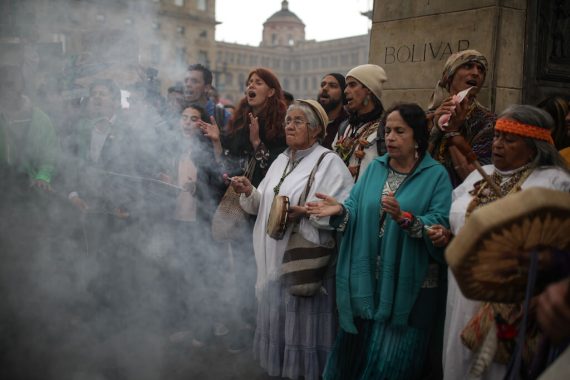We learn more about the climate crisis every year. The evidence is pouring in: increasing temperatures, enormous deforestation, and record rains. And, once a year, we learn more about the human cost of climate change, when data on the deaths of land and environmental activists, the same individuals who are highlighting and resisting the disintegration of our climate, is revealed. According to Global Witness’s annual report, that number increased to a record 227 murders globally in 2020.
The 2021 Global Witness report has gathered data on the death of land and environmental activists over a nine-year period, beginning in 2012. During this period, a bleak picture emerged. There are signs that as the climate crisis worsens, violence against individuals who defend their land and the planet is on the rise as well. The inexplicable exploitation and greed that exacerbated the climate crisis also contributed to violence against earth and environmental activists.
The report states that “[i]n 2020, we recorded 227 lethal attacks – an average of more than four people a week – making it once again the most dangerous year on record for people defending their homes, land and livelihoods, and ecosystems vital for biodiversity and the climate.” The authors of the report claim that an average of more than four individuals are killed each week, which is more than double the amount recorded in 2013. They also linked the increase in violence against climate change and earth activists to the worsening of the climate catastrophe.
Murders, Threats, and Much More
According to the UN Special Rapporteur on the Rights to Freedom of Peaceful Assembly and of Association, environmental activists struggle to exercise assembly and civil rights around the world.
Kenya
Activists in Kenya’s Lamu County have been trying to raise awareness about the environmental, health, and climatic consequences of the Lamu Port-South Sudan-Ethiopia-Transport (LAPSSET) Corridor project, which includes a proposed coal-fired power station. According to Human Rights Watch, at least two activists were kidnapped by persons posing as police officials on Lamu, a Kenyan island, in 2016, and are still missing.
Brazil
People in Brazil are risking their lives to save the Amazon rainforest, which is one of the world’s most significant carbon sinks. Intimidation, threats, and violence are used by criminal networks involved in illegal deforestation against anybody who stands in their way by denouncing their unlawful operations, including Indigenous peoples, small-scale farmers, community leaders, and even environmental law enforcement officers. Human Rights Watch recorded 28 homicides, four attempted homicides, and more than 40 death threats connected to illegal forestry between 2015 and 2019, the majority of which took place between 2015 and 2019. Only two of the offenders in these incidents have been brought to justice.
South Africa
Communities across South Africa are voicing concerns about mining and coal-fired power plants’ significant environmental, social, health, and climatic impacts. Human Rights Watch recorded how such advocacy has been greeted with intimidation, assault, and even murder in several cases. The perpetrators of the attacks are frequently unknown, but activists suspect that they were assisted by police, government officials, private security providers, or others operating on behalf of mining firms.
People and the Planet before Profit
Many businesses use an extractive economic strategy that prioritizes profit over human rights and the environment. This form of corporate dominance is the fundamental factor that has not only brought the climate catastrophe to its brink but has also perpetuated the murders of environmental advocates. This has been an ongoing theme of corporations operating with arguably total impunity in many nations that are rich in natural resources and climate-critical biodiversity. The balance of power is tilted in favor of businesses, so therefore it becomes uncommon for anybody to be jailed or charged with killing environment defenders.
The disproportionate attacks on Indigenous people continue, with more than a third of fatal attacks targeting tribal people – even though tribal communities account for only 5% of the world’s population. In the seven mass killings recorded in 2020, indigenous peoples were the subject of 5 of the 7 mass murders.
Recommended
Speaking on the relationship between big corporations and the dissolving rights of Indigenous communities, environmentalist and academic Bill McKibben stated,
[Defenders are] at risk because they find themselves living on or near something that some corporation is demanding. That demand – the demand for the highest possible profit, the quickest possible timeline, the cheapest possible operation – seems to translate eventually into the understanding, somewhere, that the troublemaker must go.
Can We Fix This?
In the 2021 Global Witness report, suggestions were presented for stemming the tide of violence against environmental activists. The report urges the UN to acknowledge that human rights are linked to a safe environment , to ensure that pledges made at the upcoming climate change conference are consistent with human rights duties, and that governments safeguard defenders by regulating extractive industries and putting a stop to any efforts to criminalize protest and land defense. Furthermore, the report urges businesses to enact due diligence procedures to prevent violence from taking place anywhere in their supply chain, to adopt a zero-tolerance policy against all violence, and to offer reparations when it occurs.
The head of U.S. Communications and Global Partnerships at Global Witness Miranda Brobeck spoke to EcoWatch about the recent report, by emphasizing the relationship between the climate crisis and the economic effects of the pandemic, and how it affects environmental activists. She stated, “I think it’s also really important that we recognize the threat to earth and environmental activists on the ground, who not only are facing the health threats from the pandemic and the economic impacts of the pandemic, but are also facing the worst of the climate catastrophe and are just trying to defend our planet and their homes.”
A letter was sent by a group of environmental activists from around the world to UN Secretary-General Antonio Guterres calling on him to push the UN to support a global implementation of the Declaration on Human Rights Defenders.
Environmentalists are the first line of defense against socio-ecological collapse and the climate crisis. Because the world needs them, it should also support them.





